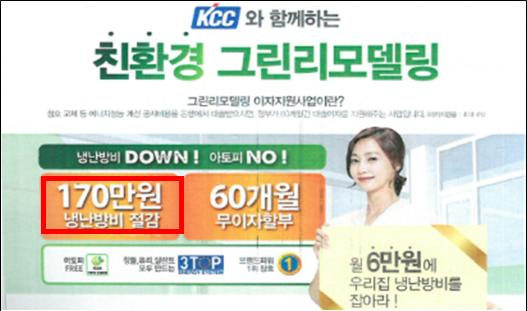
Violation of the Display Advertising Act in window product advertisements. Fair Trade Commission
Five companies that exaggeratedly advertised the energy savings of window products were sanctioned by the Fair Trade Commission.
On the 28th, the Fair Trade Commission announced the labeling and advertisements of five companies, including LG Hausys (710 million won), KCC (280 million won), Hyundai L&C (250 million won), Lee Kun Changho (180 million won), and Winche. It was announced that a total of 1.28 billion won was imposed on the act of violating the Fairness Act (Indication and Advertising Act). The amount of the penalty imposed on each company was determined based on the amount of sales generated during the advertising period.
Five companies advertised the effects of window products by emphasizing specific figures such as “Annual energy saving of about 1.7 million won” and “Energy saving rate of 51.4%”. First of all, the Fair Trade Commission inflated and advertised these companies as if they could enjoy savings in energy savings and heating and cooling costs that can only be found in certain environments.
In the course of the investigation, the company insisted that the test results used in the advertisement could sufficiently prove the content of the advertisement. However, the FTC made a problem with the content that these companies advertised the effect of reducing gas bills as savings in electricity bills, or that all cooling costs were reduced based on the savings in heating costs. According to the Fair Trade Commission, the energy saving rate of apartment houses replaced with windows of grade 2 or higher in the actual green remodeling project was found to be at an average of 14.5%.
You need to check whether’restrictions’ are listed
The FTC also pointed out that the’disclaimer’ that the test results used by these companies in advertisements may not appear in circumstances different from the test conditions are not properly stated. Since there is no standardized method to measure the energy and cost savings of window products, business operators can test on the premise of a specific environment and use the results for advertisements. However, these companies did not state any restrictions or wrote only formally, such as’it may vary depending on the user’s living environment’.
Some companies argued that “the brand is an important consideration when choosing a window and the energy saving effect is not a consideration for consumers.” However, the FTC determined that the reduction of heating and cooling costs was also a factor that influenced whether consumers would purchase or not.
“Consumers have no choice but to rely on the information presented by business operators because it is difficult to know the specific energy saving effect of windows and doors,” said Moon Jong-sook, head of the Consumer Safety Information Division of the Fair Trade Commission. There is a risk of being mistaken for it,” he explained. Manager Moon said, “It is the position of the Fair Trade Commission to state the degree to which’we set these conditions to derive specific test results’ in the advertisement.”
Sejong = Reporter Seongbin Lim [email protected]
![]()
